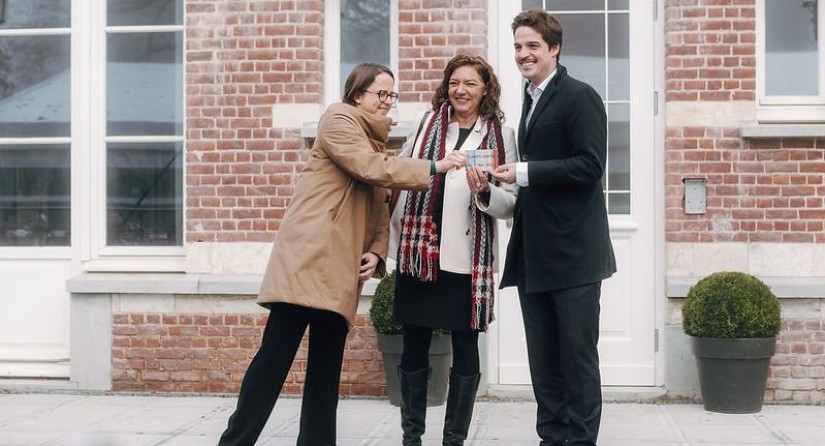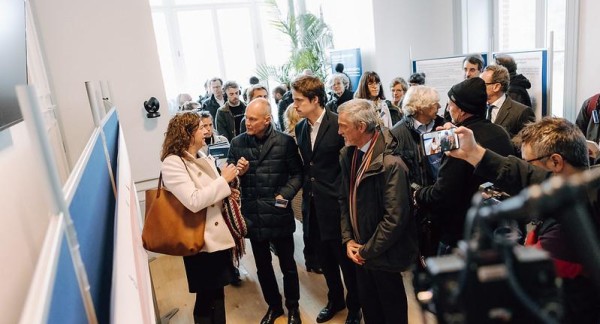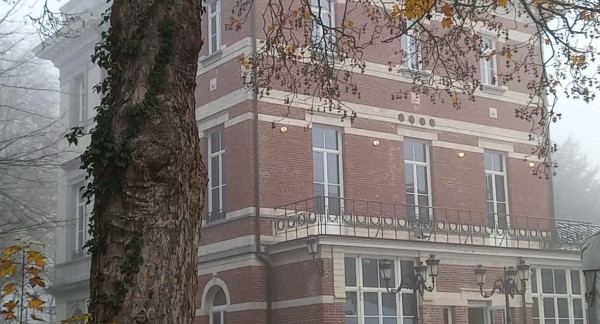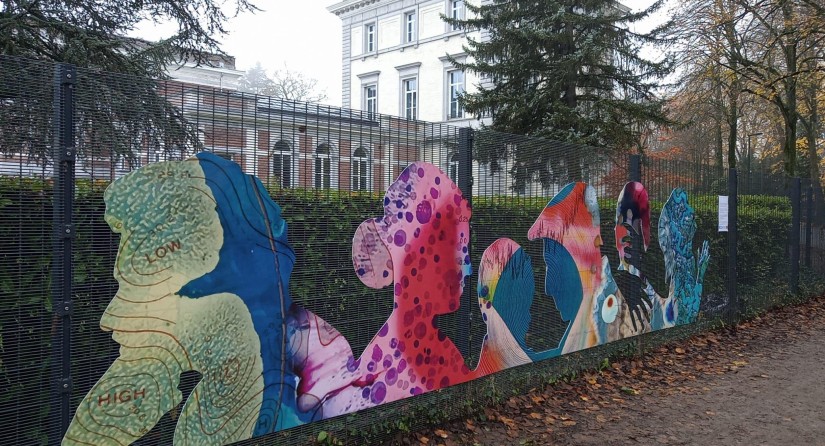Inauguration of the Belgian Climate Centre

On 29 November 2022, State Secretary for Science Policy Thomas Dermine, Scientific Director Valérie Trouet and Operational Director Ella Jamsin officially opened the Climate Centre at the "Space Pole" in Uccle. The event was attended by representatives of the Federal Scientific Institutes, the academic and business communities, and Belgian policymakers. Bertrand Piccard, who flew around the world on the solar plane Solar Impulse, was the special guest and gave an inspiring speech.
The current climate change poses many challenges to society. The latest IPCC reports indicate that global warming will increase by 2050 under any scenario unless significant reductions in greenhouse gas emissions are made in the coming decades. More than ever, we need to understand this change in all its aspects and put in place solutions to deal with it.

The Climate Centre was established on the initiative of the State Secretary for Federal Science Policy, Thomas Dermine. This centre brings together and coordinates the climate research of the Federal Scientific Institutes (Royal Meteorological Institute, Royal Belgian Institute for Space Aeronomy, Royal Observatory of Belgium, Royal Belgian Institute of Natural Sciences, Royal Museum for Central Africa and Sciensano). It aims to strengthen their collaboration with other research centres and universities and to focus more on the needs of economic and political actors (adaptation measures, mitigation strategies, etc.).
“Belgium has world-class research centres and knowledge institutions working on climate. By joining forces, we can create the largest climate research centre in Europe,” says State Secretary Thomas Dermine. ”By organising structural cooperation between the various partners and the coordination of the Climate Centre, we want to take Belgian climate research to a higher level. In addition, the mission of the centre is to enable politicians and businesses to make more evidence-based decisions.”
An annual support of two million euros is budgeted for the centre. Besides the scientific director and the operational director, the Climate Centre will employ a dozen staff.
To mark the opening, a work of art was unveiled along the Avenue Circulaire. The work, created by the Wall Street Colors collective, shows human silhouettes covered in patterns ranging from microscopic images of bacteria to heat waves seen from the sky, evoking the connection between all scales of our ecosystem and the central role played by humans and nature.
The Directors
The Scientific Director - Valerie Trouet
Valerie Trouet holds a PhD in Biosciences Engineering from the KULeuven. She is currently a professor in the Dendrochronology Laboratory of the University of Arizona (USA). There she studies the evolution of ancient climates by analysing tree rings, a science called dendroclimatology, which allows her to study the climate over a period of 2000 years. In 2020, she wrote a book on this subject for the general public (‘Tree Story’), which has been translated into Dutch (‘Wat bomen ons vertellen’). Valérie Trouet will take up her position as scientific director of the Climate Centre in early 2023.
“The Belgian Climate Centre offers a unique opportunity to use my expertise to implement concrete solutions that have an impact on climate issues and to build urgently needed bridges between climate science and policy” says Valerie Trouet.
The Operational Director - Ella Jamsin
Ella Jamsin has a PhD in physics from the Université Libre de Bruxelles. Her thesis was on the study of black holes. She then turned her career towards sustainable development and the circular economy, notably with the Ellen MacArthur Foundation, which works to accelerate the transition to the circular economy. She has also been assistant professor in Design for Sustainable Development at the University of Delft, the Netherlands, and an independent consultant on climate issues. She will take up her position as Operational Director of the Climate Centre on 1 December 2022.
“I am looking forward to the opportunity to work with the Belgian scientific community to increase their impact on government and private climate policies” says Ella Jamsin.
Renovation for the Climate Centre

The climate centre will be located at the "Space Pole" in Uccle, in a house that traditionally served as the home of the director of the Royal Meteorological Institute.
The building was recently completely renovated and redesigned by the Public Buildings Administration of the Belgian federal state, to house the Climate Centre. It now consists of several offices, conference rooms and studios for scientists temporarily staying at the site.
The renovation project also included many energy improvements: high-efficiency gas boilers, thermodynamic boilers for hot water production, double interior wall insulation, a controlled mechanical ventilation system, rainwater recovery tanks and LED lighting. Finally, a ramp was installed to make the building accessible to people with reduced mobility.
The works carried out represent an investment of more than EUR 3 million.
Climate Research at the RBINS
The federal scientific institutions concerned presented their climate-related activities in the form of posters at the opening of the Climate Centre. The RBINS also pays special attention to climate in various research areas.
- Paleoecology – The effect of historical climate change on the palaeofauna and on human settlements (economy, society, domestication, etc.) informs how life responded and can serve as a model to predict the effects of the current crisis.
- Biodiversity – The introduction and spread of invasive alien species is often triggered by climate change, leading to changes in species composition.
- Marine ecosystems – The marine research groups analyse ecosystem changes associated with sea surface warming observed by long-term remote sensing, in situ monitoring and modelling: changing phenology of plankton, changing distribution of fish species, changing hydrodynamic patterns and sediment transport, ... This information serves various human activities in the marine environment.
- Antarctic research – Antarctic marine and terrestrial ecosystems are studied as indicators of climate change. Thanks to a central database and data portal, shifts in the geographical distribution of species due to climate change are being demonstrated.
- Geology – The geological survey supports technology development for CO2 storage at production sites and conducts research to support geothermal energy applications.
In this way, the RBINS contributes to understanding climate change, predicting its potential impacts, and developing options to mitigate climate change and its effects.
